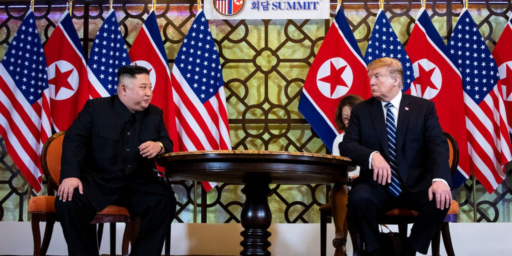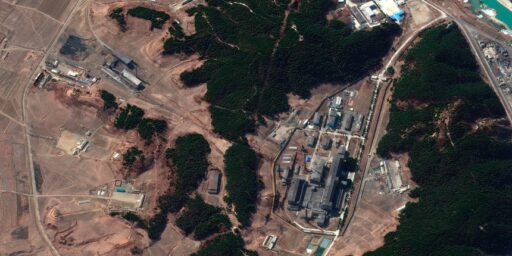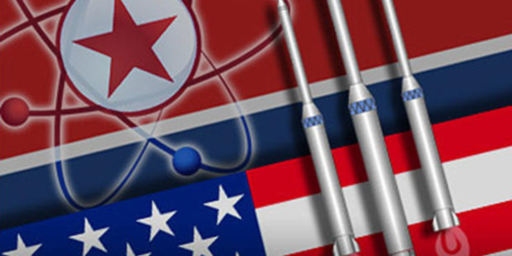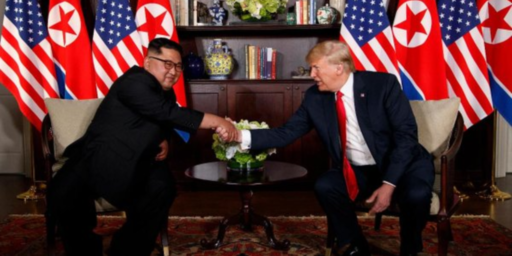North Korea to Restart Nuclear Reactor
A North Korean diplomat has announced that North Korea is preparing to restart its nuclear reactor, partially dismantled last year as part of its negotiations over its nuclear program:
PANMUNJOM, Korea – North Korea said Friday it is making “thorough preparations” to restart its nuclear reactor, accusing the United States of failing to fulfill its obligations under an international disarmament-for-aid agreement.
It is the first time the communist nation has confirmed a reversal of steps taken since last year to disable its nuclear program because of Washington’s refusal to quickly remove it from a U.S. terrorism blacklist.
“We are making thorough preparations for restoration” of the Yongbyon nuclear complex, the deputy director-general of North Korea’s Ministry of Foreign Affairs, Hyun Hak Bong, told reporters. He did not say when Yongbyon might begin operating again.
The sticking point for the United States seems to be North Korea’s reluctance to accept a program to verify its actions.
Voice of America adds a few helpful details:
- It’s estimated that it will take less than a year for North Korea to restore the reactor.
- North Korea has improved its missile testing facility.
- It’s been reported that North Korea is testing its longest-range missile, theoretically capable of striking the United States.
Have a nice day.





I’ve got a question for Obama; How do you plan to deal with NORK, given that the negotiations you usually call the solution to any old thing that comes up, have worked out so well in this case?
The negotiations in this case were a success, it was the follow-through that failed.
Was it? Or did both sides fail to understand the nature of the negotiations?
If that’s true, then Neville Chamberlain’s negotations were successful as well.
Wow… reality… what a concept.
It’s possible that the agreement was too vague, and this is the result of different interpretations of the agreement. However, that’s not how it reads to me, to me it reads that the agreement stipulated a verification program that the DPRK has thus far refused to implement.
No, and I never claimed that all negotiations were successful. Chamberlain’s negotiated agreement was terrible for everybody but Hitler.
Wrong! All wrong! Unless you understand the plutonium cycle given the North Korean technology, you will never get it.
It is a batch process:
1) Load the reactor with fuel to be transmuted into plutonium.
2) Run the reactor until the fuel is converted.
3) Shutdown and wait for the worst of the radiation to decay.
4) Extract the plutonium filled fuel rods.
5) Perform necessary reactor maintenance/upgrades.
6) Repeat.
The North Koreans have repeated the cycle on schedule and without interruption for decades.
When it is nearing time to shutdown, they “negotiate” ending their nuclear program and get lots of western food aid and stuff. They show “good faith” by partially dismantling the facility (blowing up old cooling towers and stuff) which is a cover for regular maintenance. Then, when they are ready to start a new cycle, they claim the U.S. failed to live up to the bargain.
The U.S. government knows this, but they are helpless to stop it. It is easier for the government to fool the American people with “negotiation” talk, than to admit they can’t stop North Korea from making all the plutonium it wants.
And never did.
And why? Because the Nazis never intended to follow through on the promises they made, which made the very successful negotiation, worthless.
Not unlike what we negotated with NORK, eh? I siad at the time this was signed I had my douts that the Koreans were negotiating in good faith and my skepisism appears to have been more than justified.
The take away here is that there are some with whom you simply do not negotiate. Sadly, ew’re about to relearn that lesson. We can only hope it’ll take less lives, this time than it did back in Neville’s day.
No, the negotiation was a failure because Britain and France gained nothing by abiding by it, and Germany lost nothing by breaking it.
This is not ultimately the case here, where we are still withholding something that the DPRK wants, though we still don’t really gain anything by abiding by the agreement. This wasn’t a great negotiation, you can probably argue that it wasn’t even a good one, but it’s hardly on the same level as the Munich agreement.
If by “some” you are referring to individuals and not nations, then I would agree with you. I don’t see much utility in negotiation with Kim Jong-il.
Please tell me one treaty the Nazis actually abided by.
You mean we wouldn’t get what we wanted… and the only reason we were ever negotiating with them in the first place… to get them to stop buidling nukes?
Well, gee… just what have we been talking about then?
Perhaps. But I submit the test cannot, in reality, be made, assuming il is still functional… and there now seems some question about that. Which of course leaves us the question of who IS in charge…
And that would be?
You are still barking up the wrong tree. Negotiation had absolutely nothing to do with the situation. That reactor was shutdown either on schedule, due to operator error or due to equipment malfunction. It’s all part of the plutonium production cycle, and the U.S. has no control, negotiated or otherwise, over any of it.
If you persist on working the negotiation angle, you are either Jimmy Carter class naive or a political demagogue.
That may be overstating the case.
It did in fact have soemthing to do with this process. It has apparently made an effective enough smoke screen so as to hide the true intent of the North Koreans, if Micheal’s comments are of any indication. Thus do we learn that some will use negotiation as they would any other weapon… against their enemy.
I can’t name a one. Did you have a point on that?
Sorry, clumsy phrasing on my part. We wouldn’t gain anything by adhering to the agreement, the only benefit we would get is the DPRK losing something. This was to contrast to the Munich agreement, where Britain and France gained nothing, and Germany lost nothing.
Maybe not, in fact probably not, but there are elements within the DPRK’s communist party that lean more towards Chinese communism, and with them I do believe negotiation is possible, and will be useful in the future.
You could be right about that, I’m not familiar with the details of the DPRK’s program, or the details of the agreement. I would hope that those conducting the negotiation would at least be aware of what you are suggesting is happening, which may be why the US is insisting on verification before continuing to implement the agreement.
I should think this fairly a obvious point, describing fairly clearly their intent. If they failed to abide by any other treaty, what on earth makes you think your overly benign explanation of their not following this one plausible?
Well, it is seldom an analogy survives a full examination.
Perhaps. OTOH, we could see a leadership change breaking off what little Chinese influence there is, as well, with NORK going more isolationist and paranoid. Until that gets settled, I wonder that anyone would consider such negotiations with them to be of any utility at all, past being able to say to the remainder of the word… including the Chinese… “hey, man, we tried.” And, frankly, past that one small point, I’m forced in large part to agree with William…
I’m not entirely sure it’s possible to get more isolationist and paranoid than the DPRK.
Our options are to either 1) tacitly endorse it by doing and saying nothing, 2) explicitly disallow it using force, or 3) try to prevent with diplomacy which keeps us from having to commit to force while still allowing us to maintain an opposition.
Since we don’t want to do #1, and it’s not yet worth it to do #2, we’re left with #3 which, while not a great option, is still better than the other options.
Applying this to your Chamberlain example, Britain and France didn’t want to do #1, were unable to do #2, and so was left with only #3. Hitler understood that #2 wasn’t an option for the allies, so he was able to get all the benefit of #1 by allowing Britain to do #3. Chamberlain’s error was entering negotiations with only #1 and #3 available to him.
How is McCain going to deal with them? What are the options? Diplomacy or nuclear war.
Don’t much like the second. Goodbye Soeul, goodbye Tokyo, and maybe San Francisco (gulp!) LA and Seattle.
It’s easy to be an armchair tough guy, a little more difficult in the real world.
I already listed the options, and oddly enough nuclear war wasn’t one of them yet. Maybe in 10 years if we stick with option #3, or 5 if we stick with #1, but not now. The DPRK couldn’t successfully nuke a cave at this point, I think LA is safe.
Iran leaps to mind.
#While they continue to build up their weaponry. In short, we wait until they’re ready to do some real damage.
And no, Anjin, given the state of their systems there, it doesn’t come to Nuclear war. If their most recently series of tests is of any indication, we can mount a short conventional attack. Consider the lives saved in that process, instead of waiting for them to get their mushrooms together, as it were.
THeir actions speak clearly of their intent, here.
I guran-damn-tee you that when the day comes they can actually mount an attack you’ll blame the Republicans for not reacting to the danger.
Hopefully not. But you have a couple of million lives riding on that bet, and it is a bet, not a certainty.
No one really thought something like 9/11 could happen. But it did. Life is full of surprises, some of them are really nasty…
If Iran were half as isolationist as the DPRK, we’d all be a lot less concerned about them I think.
We wait until restraint becomes less desirable than force. It’s not there yet.
There are no certainties, technically we’re taking a bet every day that France won’t nuke LA.
Yeah they did, there were entire scenarios that revolved around pretty much exactly what the terrorists did on 9/11. They just didn’t think it was likely enough to warrant the cost of trying to stop it.
Casts an interesting light on then National Security Adviser Condi’s statement shortly after 9/11 that no one ever dreamed jetliners could be used as weapons…
Holy crap dude, did you just completely reverse your argument over the course of the last 30 minutes?
You’re as bad as Bithead, it doesn’t matter what the facts are, only how they can be made into something negative about your opponents.
No, I commented that new information you presented changed the way I think about something unrelated to what we were talking about.
You just can’t resist playing hall monitor, can you?
You’re seriously telling me this was new information to you?
I’ve given up trying to moderate you, but I reserve the right to mock you.
Sorry, I don’t have a hall pass…
And no, aside from a Clancy book where a 747 was crashed into Capitol Hill, that’s new info. Guess I lead a sheltered life.